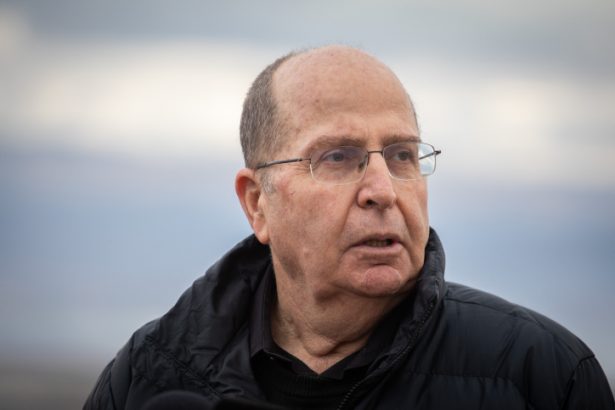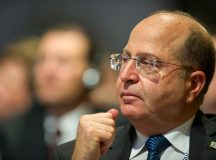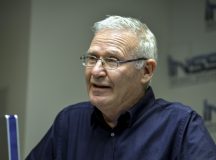Former Israeli Minister of Defence Lieutenant General (Ret.) Moshe ‘Bogie’ Ya’alon was born in Kiryat Haim in 1950 and is a founding member of Kibbutz Grofit in the Arava. He served as chief of General Staff of the IDF, vice prime minister, minister of strategic affairs, and member of Knesset for the Likud Party. He left the Likud in 2017 and helped found Blue and White, a key component of the anti-Netanyahu bloc which has now entered government. Fathom’s Sam Nurding sat down to talk with Ya’alon about his book The Longer, Shorter Path and about his time in Blue and White, Israel’s security challenges, the Israeli-Palestinian conflict, and the future of Israeli society. For more information on Ya’alon’s book, click here.
In the ‘cockpit’ of the Blue and White party
Samuel Nurding: I wonder if we can start the interview with the last few chapters of your book. You dedicate those pages to your political career, especially when you were one of four in the ‘cockpit’ of Blue and White. What was the idea behind the alliance and how was the relationship between three former Chiefs of Staff and Yair Lapid?
Moshe Ya’alon: The idea behind Blue and White came from the four of us; myself, Benny Gantz, Gabi Ashkenazi and Yair Lapid. We had each experienced being in a Netanyahu government, in different capacities. We realised that we needed to take the State of Israel onto a different track. The way to do that, according to our understanding, was to create an alternative type of government. We didn’t agree on everything, but we did agree on the necessity of changing the situation, particularly the internal situation. We found the country divided purposely by Benjamin Netanyahu in order to gain power. For us, understanding the challenges of the State of Israel, we believed that Israeli society has to be unified, not divided, if we are to meet those challenges. And of course we criticised the corruption of the government, the harming of democratic values, the weakening of checks and balances, and the mismanagement of the running of the country.
SN: Blue and White challenged Prime Minister Netanyahu in three elections between 2019-21. Looking back now, why do you think you failed to unseat Bibi?
MY: We created Blue and White in February 2019 and we had initial success. In the first round of elections we equalled the Likud with 35 mandates. In the second round of elections we won 33 mandates to the Likud’s 32, and even now, after four elections and the prospects of a new government, the discussion still inside the country is either for Netanyahu or against Netanyahu. Unfortunately, after the second round of elections I witnessed the lack of determination to unseat Netanyahu from Benny Gantz. Although we won, he was already ready to join Netanyahu at that stage. I became very frustrated – it wasn’t the idea to serve under Netanyahu. We were supposed to serve instead of Netanyahu. We had to replace him.
After the third election, Gantz and Ashkenazi decided to enter into government with the Likud. The reason for doing so, COVID-19 and the emergency situation, was just an excuse. I didn’t believe it and I told Gantz and Ashkenazi ‘Netanyahu is using you to break up Blue and White.’ Nowadays, Gantz admits it was a mistake, but I knew then that all of Netanyahu decisions were made for personal interests to run away from his corruption trial.
So, the failure of Blue and White was the lack of determination by Gantz and Ashkenazi to challenge Netanyahu and create an alternative government.
Arabs and Israeli Politics
SN: Blue and White failed to build a government resting on outside Arab support after the September 2019 election. What was your thinking about incorporating the Joint List at the time and how did views evolve?
MY: At the very beginning of our campaign I approached the Arab sector in Israel. And I was welcomed. I spoke to them about their challenges concerning the rise of domestic violence and crime, master plans for legal construction, improving education and employment etc. I did so in order for us to have a real campaign for the Arab community. In the second round of elections we were the first Jewish Zionist party to get substantial votes from the Arab sector. I believe now that there is a real shift happening: in the past Arab parties spoke through the lens of Palestinians in Judea and Samaria, and used to embrace Mohammed Qadhafi and Bashar al-Assad. Now they speak about their challenges in Israel.
However, this was one of the manipulations of Netanyahu. He understood that we weren’t able to create a government without the Arabs, and he still had the ultra-Orthodox and religious-Zionist parties in his pocket. Nevertheless, I told my colleagues that we had to rely on the Arab parties if we wanted to replace Netanyahu. Yes, we still don’t agree on the basic values of what the State of Israel should be: Jewish and democratic. But that hasn’t stopped Netanyahu from relying on Arab support to his advantage, for example when electing his candidate to the State Comptroller, as well as in other Knesset votes. And after the first round of the elections, in early 2019, Netanyahu was ready to cooperate with Mansour Abbas. So I argued that we shouldn’t boycott the Arabs. Again, if Benny Gantz had been determined to make it happen, then I believe it would’ve happened. He hesitated and again, from what I saw and understood, he wasn’t determined to become Prime Minister.
After the last round, Abbas smartly declared that he would go with any government. When Netanyahu tried but failed to bring him into his coalition, he still has the audacity to incite the Bennett-Lapid government for cooperating with the Arabs! Nevertheless, when you look at the historic trend of the Israeli Arabs, you see a pattern of ‘Israelisation’ – they want to be part of society and appreciate that they live in a democracy. They also see their relative economic prosperity, when compared to other Arabs in the region. We meet them in the hospitals, in nurseries, in pharmacies, in the high-tech sector. I tell the story in my book about the time I paid a condolence visit to an Israeli-Arab Muslim family in 2004. The son was killed in Gaza fighting Hamas. When I paid my condolences, the father – out of the regular custom for Muslims – called for all the women to come to the visitors room and gave a speech. He said that after the clashes between Israel Police and Israeli Arabs in 2000, he told his sons that if they want to live in the State of Israel, they had to participate in its defence. I believe in embracing the Israeli Arabs. The government should never label them as ‘terrorists’.
I have been very critical of the Netanyahu and especially Ben Gvir and Smotrich way – inciting against the Arabs.
SN: Mansour Abbas is the leader of the Arab Islamists in Israel, which is more or less an arm of the Muslim Brotherhood. Should Lapid, Bennett and co. not be concerned about what he represents?
MY: If you try to compare Mansour Abbas to Aymen Odeh [leader of the Hadash faction in the Arab Joint List], Abbas is more extreme. As you say, he is a member of the Muslim Brotherhood, and they have a principle, which goes like this, ‘We have to conceal our real intentions’ (‘Taqiyya’. But as long as we are strong, I’m not afraid of Israeli Arabs in any faction. We have to offer them a better future and enjoy the fact that today we are strong, and we can offer them many advantages and to improve their position in Israeli society.
On Naftali Bennett
SN: Bennett is the new prime minister, but throughout the book you are critical of his Bibi-esque tendency to look for political wins by exploiting sensitive cultural issues, often at the expense of good leadership and Israeli values. How confident are you that he will be able to hold together this very broad unity coalition?
MY: I believe Naftali Bennett has become more mature regarding his politics and ideology. I think this because I have helped him, Gantz, Saar and Lapid to form the alternative government and have seen the discussions. It’s now up to him to prove himself to keep this coalition together, but I think he is fully aware of the challenges. He and his colleagues in the government understand the need to at first leave alone the issues that can break them up, like religion and state. The fact of the matter is that we need to return to managing the country; we don’t have a budget yet and there are no long-term plans. Everything for the past several years has been subject to the personal interests of the Netanyahu.
Gaza
SN: You make the point in the book that one reason Israel failed to learn the lessons from the Second Lebanon War was group-think. Israel has just concluded a fourth major escalation with Hamas since its take-over in 2007. Is Israel now struggling with group-think over what to do about Gaza?
MY: I don’t entirely agree with this diagnosis. Why? I cannot see any political or decisive military victory in Gaza. In my book I term the desire of Israelis to seek solutions to problems as ‘solutionism’. And we want to have it now, which is ‘nowism’: instant democracy, instant peace. I don’t believe in these things. We need to look at problems with a longer-term perspective. That is why the title of the book is The Longer, Shorter Path.
When it comes to Gaza you have to weigh the cost and benefits. I remember talking about these issues after the 2014 war. The Israel Defense Force (IDF) could take over Gaza, yes, but what then? Who will control the Strip? Who will spend the money to rebuild it? Us? So we decided that it was better someone else to be accountable and unfortunately it is Hamas.
After Operation Protective Edge we had several years of peace and quiet. Hamas didn’t shoot a single rocket. Islamic Jihad (PIJ) tried to make provocations, and Hamas prevented it – fine, accountable. What we have seen in the recent escalation in Gaza is better capabilities of the IDF, based on intelligence dominance. To intercept a terrorist, whether he’s in a car, a room, or wherever, to know exactly the shape of the tunnels inside Gaza and to destroy them, depends on a combination of intelligence dominance that has improved over the years and accurate firepower. That is why we could manage the operation without the need to deploy a ground operation. Hamas paid a very heavy price for firing rockets. Their military and production capabilities were severely diminished but we have to wait and see to know how much they will be deterred. We are not at the end of the conflict with Hamas and there are no shortcuts. I have to quote US President Biden, who said two weeks ago: ‘Until regional parties say unequivocally that they acknowledge the right of Israel to exist as an independent Jewish state, there will be no peace.’ This is the core of our challenge in a nutshell.
Communal violence
SN: You refer in the book to the speech the then-deputy Chief of the General Staff Yair Golan gave on the eve of the Holocaust Remembrance Day in 2016, in which he said that many Israeli youths were exposed to a process of radicalisation. The speech, however, is remembered for the ill-comparison Golan made between processes taking place in Israel and events in Europe during the 1930s. Given the events inside Israel last month, the lynching of Jews and Arabs, the radicalisation of youth on both sides, was Golan’s core message too quickly dismissed in 2016?
MY: Golan was right, yes, but he should not have said what he did on the eve of the Holocaust Remembrance Day. As we have mandatory service in Israel, all Jewish youngsters participate in the military at a young age. I claimed that I knew the Israeli youth better than most in Israel as I commanded many of them in my military service. Even this week I met several Israeli youths as part of my role in a preparatory institution for military services for high school students. Since 1988 I tried to meet with as many young Israelis as possible and to talk with them about leadership and what they think Israel’s future should be. I believe that Israel as a Jewish state should be a model country based on Jewish values. So when we meet the youngster in the military we can analyse the level of racism, extremism and tolerance of Israeli society.
At the time of Golan’s speech, the case of Elor Azaria, a soldier who decided to kill a neutralised terrorist, was ongoing. Azaria shot because he felt the terrorist deserved it, not due to any immediate threat to his life. This is against our values and our laws. We knew he used to go to soccer games shouting, ‘deaths to Arabs’. Pure racism. I cannot tolerate it. This was Golan’s advantage: being able to look Israeli society from the perspective of the youth coming through the IDF. In this regard, he was right. But he shouldn’t have compared it to Nazi Germany and at the time he did – which led people to not to listen to his words.
Iran
SN: On Iran, there is an argument that goes like this: Israel has managed several major successes inside Iran, in tackling the nuclear programme. However, it is failing when it comes to pushing back Iranian influence in the region, the latest example being the Gaza escalation and scale of Hamas’s rocket attacks. Is this something you agree or disagree with?
MY: I agree and disagree. When I served as head of military intelligence in 1995 we exposed the intention of the Iranian regime to develop military nuclear capabilities. At that stage we were alone; the Americans didn’t agree with us, not talking about the Europeans. Nevertheless, our assessment was that in a success-oriented process, the Iranians could get a bomb within 10 years. We’re now in 2021, they haven’t got the bomb, but they are still determined to acquire nuclear military capabilities. They haven’t been able to achieve their goal because something has happened along the way. It is not just the military approach, or covert operations, but has been, especially under my watch as Defence Minister but less so in the last few years, of international political isolation of the Islamic Republic, crippling economic sanctions, a credible military option – all of which, combined, might again generate the internal unrest in Iran like in 2009.
Without understanding it this way, there is no chance of convincing the Iranian leaders to give up or delay their process to acquire military nuclear capabilities. And the main mistake regarding the JCPOA was that the P5+1 [US, UK, France, Germany, China and Russia] led by the US decided to concentrate only on the enrichment process and left alone the missile file and the terrorism file, which have become the predominant challenges to us in the last five years. You can find Iranian fingerprints all over the region. This should have been part of the agreement, but the Obama administration was in a hurry to get a deal done. But if you are dealing with a country [like Iran] that looks at its situation in historical contexts and works in centuries, whilst you concentrate in days and months, you are inferior and seem in a hurry. And that was the crux of the problem and why I, and Netanyahu, said the JCPOA was a historic mistake. I believe US President Trump was right to return to pressure on the Iranian regime, but he shouldn’t have withdrawn from the JCPOA.
SN: Is that not contradictory?
MY: If you decide to violate an agreement first, you allow the other side to violate it afterwards and in doing so, you lose the support of your partners. Instead, we need all Western partners working together to meet the challenges of Iran, including pushing back against where Iran’s regional activities. In this regard, I was critical of Netanyahu for pushing Trump to withdraw, and of the loss of bipartisan support in Congress due to Bibi’s undermining of Obama. If you look at the situation now, for Israel the US is a cornerstone to its national security. We’re much better off to have disputes in the room. We have too much knowledge and intelligence to be left out of the room. But to be in the room, you have to accept that there might be disagreements, and to not publicly shout out if you don’t get what you want.
The Israeli-Palestinian conflict
SN: You write that until the Palestinian leadership understands the Jewish state is ‘here to stay’, Israelis must not try to resolve the conflict. If it is unsolvable until the Palestinian accept the Jewish identity, what does managing the conflict look like to you?
MY: I have a lot of experience dealing with the Palestinians and the conflict, serving as a division commander in the West Bank in 1992-3, in what is considered the end of the first intifada. (I don’t term it that because there was only one – the perceived ‘second’ wasn’t an intifada, but a deliberate attack led by Yasser Arafat.) I have lived the conflict, demonstrated in my many military and security postings under numerous governments. One of my main challenges was stopping the ‘suicide bombings,’ what we called ‘mowing the grass’ and to eliminate the terrorist capabilities. The lesson I take away from my experience is that we don’t have a partner for territorial compromise. We have to spell this out clearly. Even Abu Mazen, who is considered a moderate and pragmatic, is not prepared to agree a peace. At the end of the day, we will have a final settlement based on territorial compromise in which the Palestinians give up their desire to take Tel Aviv and elsewhere.
The good news at the moment is that they are dependent on us – we’re like Siamese twins – they cannot survive economically without the Israeli economy. Their currency is the shekel. Their main financial income is not donations, but by being employed by Israeli employers both in Israel and the West Bank. We have to find a way that looks out for not only our interests but their interests too, and to develop a path from the bottom-up rather than top-down.
Let’s leave Oslo alone. I don’t believe in lawyers writing contracts for the Middle East. I believe in interests. That why we succeeded in developing the relationship with Sunni Arab regimes. When we look to the West Bank, we see the Palestinians enjoy some independence, but not enough. They have some level of political independence through the PA, which is good. I don’t want them to have a vote for the Knesset and I don’t want them to be second-class citizens of Israel. But territorially, we might have to decide for ourselves what will be our land and what will be their land. Economically, even with their own territory, they will be unable to survive without being connected in some way to Israel, for electricity, water and many other things. A complete separation is impossible. But we are the stronger side and we have to use it for our benefit. Regarding security, as long as we enjoy the freedom to act, we can prevent the Palestinian Authority from falling into Hamas’s hands in the West Bank.
Solving our conflict is more complicated than slogans like ‘two-states’ or ‘one-state’. I want Palestinians to live in dignity and well-being. And when we proceed in the right way then, there too, we will realise that the longer path is the shorter one.
Israeli Futures
SN: I want to ask you about your views on Israeli youth today. You had a deep sense of duty as a young man that directed you throughout your career. Do Israeli youth still have that sense of duty? What is the likely future of the State of Israel, and the IDF, given the youth of today?
MY: I was born in 1950. I say in the book that in my birthplace, none of us had cars, telephones, Nike this and Adidas that. We were all equal and we all had the same things. For us, it was very clear that in a young country we had to take responsibility to develop it and defend it. This sense of the need to serve the country was very evident among us. I think it is still prominent among Israeli youngsters today, but there is a formidable challenge to keep them thinking that way Why? Because society has become more material. Competition is rife for the supposedly better things. Our challenge now is to keep both a proper awareness of the existential threat on the one hand, and to enjoy the fruits of living in a prosperous country on the other hand.
We must understand that our greatest success is not our material resources but our people. I paid a visit as Defence Minister to meet a US General who commanded an international exercise flying F-16s. The General asked me, ‘What is your secret?’ I said, ‘What do you mean?’ He replied, ‘How come your pilots are the best in all the fields, air-to-air battles, navigation, accuracy targeting?’ I pointed to my heart and my mind. ‘This is the Jewish Zionist spirit. All our pilots understand their responsibility to defend our country, and the price of not doing so. They will do their utmost to be the best. As long as we educate our youngsters according to the Jewish- Zionists values – our future is bright.




































